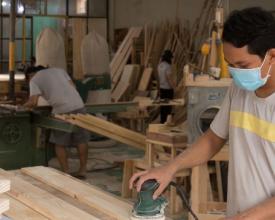Commerce Department Rules On Vietnam's Trade Status
In a major victory for DHA's hardwood plywood and engineered wood flooring trade coalitions, the Department of Commerce has agreed that Vietnam is still a non-market economy. This is a big decision since Vietnam is the leading source of U.S. imports of both products—and these imports have been growing in recent months. DHA's trade coalitions filed comments advocating for this decision, which will make it harder for Vietnam to obscure trade-distorting practices that harm U.S. manufacturers and workers.
Unfortunately, it remains a challenging time for U.S. manufacturers. We are saddened to hear that the Wisconsin veneer mills of DHA member Besse Forest Products have been added to a growing list of mills closed in the last year. We may not be in a formal recession, but unemployment is growing and interest rates remain high, harming manufacturing and homebuilding.
If you have questions or comments, contact me. I look forward to hearing from you.

Keith A. Christman, President
Decorative Hardwoods Association

In an important decision for our industry, the U.S. Department of Commerce ruled that despite some progress, Vietnam remains a non-market economy country for the purpose of U.S. antidumping law.
The department conducted its review of Vietnam's status in response to a request by Vietnam's government last year. DHA trade coalitions representing hardwood plywood and engineered wood flooring provided testimony and comments demonstrating that Vietnam is a non-market economy. Commerce agreed and future trade cases against Vietnam will be more compelling.
DHA member Besse Forest Products closed three hardwood veneer and plywood plants in Wisconsin "due to an unprecedented industry downturn." More than 130 employees have been laid off. Besse Forest Products was acquired by the Hoffman Family of Companies earlier this year.
PHOTO © BESSE
The Senate has decided not to consider the Tax Relief for American Families and Workers Act. The legislation would have retroactively restored the 100% bonus depreciation tax credit, and extended the research and development tax credit that expired in 2022 and provided more favorable interest deductibility provisions. Tax will be a big issue in 2025 as more of the provisions of the Tax Cuts and Jobs Act expire.
In July, the U.S. Senate Appropriations Committee defined biomass as carbon neutral in its FY 2025 Interior funding bill. This was one day after the House passed its version of the same funding bill, which also classified forest products biomass as carbon neutral. This would maintain the current treatment of biomass by agencies that expires every year unless renewed.
DHA joined the Hardwood Federation in filing comments with the Department of the Treasury urging federal officials to classify biomass as carbon neutral, thereby qualifying for new tax credits intended to promote clean electricity. This would benefit our industry by creating incentives to expand markets for wood residuals and help defray the cost of energy required for hardwood manufacturing and mills.
Michigan's forest products industry, largely hardwoods, generated nearly $27 billion in 2022, an increase of $4 billion from 2019. Data shows that the state's forest products industry directly employed more than 40,000 people with an average salary of $80,000 in 2022 and supported a total of more than 88,000 jobs.
The volume of kitchen cabinets sold declined by 3.1% in the first half of 2024. The dollar value sold dropped by 4% in the same period. Both numbers are a slight improvement over the year-to-date trends from May. Sales volume in June was down by less than 1% vs. May, and down by only 0.3% vs. last June.
DHA member Roseburg Forest Products has published updated Environmental Product Declarations for a number of the products they manufacture, including hardwood plywood. The declarations provide information about the lifecycle environmental impact of wood products, which helps builders, architects, manufacturers, and others make more informed choices in specifying and purchasing sustainable materials that reduce embodied carbon in buildings.
Capital Testing recently announced the launch of a new accredited certification program. The program will certify low heat release materials used to construct waste containers, dumpsters, and laundry carts, as required by numerous international, federal, and state safety standards and fire codes.
The National Association of State Foresters responded with concerns to the Occupational Safety Administration's request for input about the impact on the wildland firefighting community of incorporating National Fire Protection Association standards into the proposed Emergency Response Standard. NASF expressed concern that the National Wildfire Coordinating Group's existing standards and training are being overlooked and asked that OSHA consider NWCG standards as equivalent where applicable. As NASF believes in protecting all wildland fire personnel, they requested that the proposed regulation account for the unique work environment and hazards that wildland firefighters face.
PHOTO © ERIKA WILLIAMS, USFS
Four timber companies filed a federal lawsuit against three utility companies, alleging gross negligence and recklessness leading up to the 2020 Holiday Farm Fire in Oregon. The timber companies stated that the utility companies' actions led to a "catastrophic but preventable fire" that burned thousands of acres of their timber.
PHOTO © USFS
The Department of the Interior and the U.S. Forest Service have signed an agreement with the National Oceanic and Atmospheric Administration to use NOAA's satellites for faster detection of wildfires. The agencies will use advanced remote sensing capabilities to improve speed and accuracy.
USDA will provide $190 million to help private forest landowners adapt to climate change and retain working forests. $140 million is designated for programs that help make forests more resilient to changing climate conditions and store more carbon. $50 million will be used to pay forest owners to adopt practices that increase carbon sequestration and storage.
How many native species—and which hardwoods—are growing in New York City’s tiny "pocket forest" on Roosevelt Island?
Answer: The forest, about the size of a tennis court, contains 47 native species, including oak, hemlock, and hickory.





